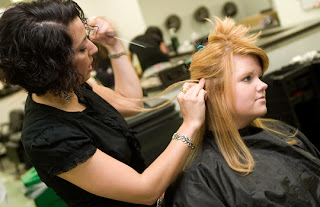Requirements
- A high school diploma or GED is often required for cosmetology jobs. Most states require prospective cosmetologists to complete a state-approved cosmetology training program. All states require cosmetologists to possess a cosmetology license.
Job Description
- Cosmetologists often focus on hair care, and may also be trained to offer manicures/pedicures, skin care and makeup services. They may also style or maintain wigs or other types of hair pieces.
Benefits
- Cosmetologists typically work in salons or studios that are well-lit and well-ventilated. Cosmetologists also get to work in hotels, spas and resorts. Cosmetologists often work independently, so they can set their own schedule and choose their own clients.
Drawbacks
- Cosmetologists often work more than 40 hours a week. Other drawbacks include having to work evenings and weekends, and infrequent opportunities for job advancement. Also, frequent use of chemicals can irritate skin and the respiratory system.
Compensation
- According to the Bureau of Labor Statistics, the average hourly wage for cosmetologists in the U.S. in May 2008 was $11.13. This includes tips and commission.
Read more: Cosmetologist Job Description | eHow.com http://www.ehow.com/facts_5877436_cosmetologist-job-description.html#ixzz1gjrNyFko


